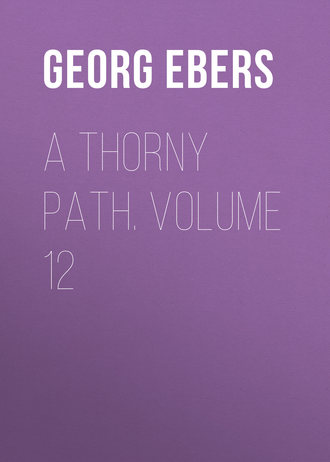
Georg Ebers
A Thorny Path. Volume 12
Was it possible that these tears could be shed for sick people whom he did not know, and for the coarse gladiator, the butcher of men and beasts, who had had nothing to give Caesar but a few hours of excitement at the intoxicating performances in the arena? So it must be; for from time to time Caracalla moaned softly, "Those unhappy sick!" or "Poor Tarautas!"
And, indeed, at this moment Caracalla himself could not have said whom he was lamenting. He had in the Circus staked his life on that of Tarautas, and when he shed tears over his memory it was certainly less for the gladiator's sake than over the approaching end of his own existence, to which he looked forward in consequence of Tarautas's death. But he had often been near the gates of Hades in the battle-field with calm indifference; and now, while he thus bewailed the sick and Tarautas with bitter lamentations, in his mind he saw no sick-bed, nor, indeed, the stunted form of the braggart hero of the arena, but the slender, graceful figure of a sweet girl, and a blackened, charred arm on which glittered a golden armlet.
That woman! Treacherous, shameless, but how lovely and beloved! That woman, under his eyes, as it were, was swept out of the land of the living; and with her, with Melissa, the only girl for whom his heart had ever throbbed faster, the miracle-worker who had possessed the unique power of exorcising his torments, whose love—for so he still chose to believe, though he had always refused her petitions that he would show mercy—whose love would have given him strength to become a benefactor to all mankind, a second Trajan or Titus. He had quite forgotten that he had intended her to meet a disgraceful end in the arena under fearful torments, if she had been brought to him a prisoner. He felt as though the fate of Roxana, with whom his most cherished dream had perished, had quite broken his heart; and it was Melissa whom he really bewailed, with the gladiator's name on his lips and the jewel before his eyes which had been his gift, and which she had worn on her arm even in death. But he ere long controlled this display of feeling, ashamed to shed tears for her who had cheated him and who had fled from his love. Only once more did he sob aloud. Then he raised himself, and while holding his handkerchief to his eyes he addressed the company with theatrical pathos:
"Yes, my friends, tell whom you will that you have seen Bassianus weep; but add that his tears flowed from grief at the necessity for punishing so many of his subjects with such rigor. Say, too, that Caesar wept with pity and indignation. For what good man would not be moved to sorrow at seeing the sick and wounded thus maltreated? What humane heart could refrain from loud lamentations at the sight of barbarity which is not withheld from laying a murderous hand even on the sacred anguish of the sick and wounded? Defend me, then, against those Romans who may shrug their shoulders over the weakness of a weeping Caesar—the Terrible. My office demands severity; and yet, my friends, I am not ashamed of these tears."
With this he took leave of his guests and retired to rest, and those who remained were soon agreed that every word of this speech, as well as Caesar's tears, were rank hypocrisy. The mime Theocritus admired his sovereign in all sincerity, for how rarely could even the greatest actors succeed in forcing from their eyes, by sheer determination, a flood of real, warm tears—he had seen them flow. As Caesar quitted the room, his hand on the lion's mane, the praetor Priscillianus whispered to Cilo:
"Your disciple has been taking lessons here of the weeping crocodile."
…………………….
Out on the great square the soldiers were resting after the day's bloody work. They had lighted large fires in front of the most sacred sanctuary of a great city, as though they were in the open field. Round each of these, foot and horse soldiers lay or squatted on the ground, according to their companies; and over the wine allowed them by Caesar they told each other the hideous experiences of the day, which even those who had grown rich by it could not think of without disgust. Gold and silver cups, the plunder of the city, circulated round those camp-fires and the juice of the vine was poured into them out of jugs of precious metal. Tongues were wagging fast, for, though there was indeed but one opinion as to what had been done, there were mercenaries enough and ambitious pretenders who could dare to defend it. Every word might reach the sovereign's ears, and the day might bring promotion as well as gold and booty. Even the calmest were still in some excitement over the massacre they had helped in; the plunder was discussed, and barter and exchange were eagerly carried on.
As Caracalla passed the balcony he stepped out for a moment, followed by the lamp-bearers, to thank his faithful warriors for the valor and obedience they had shown this day. The traitorous Alexandrians had now met their deserts. The greater the plunder his dear brethren in arms could win, the better he would be pleased. This speech was hailed with a shout of glee drowning his words; but Caracalla had heard his dearly bought troops cheer him with greater zeal and vigor. There were here whole groups of men who did not join at all, or hardly opened their mouths. And his ear was sharp.
What cause could they have for dissatisfaction after such splendid booty, although they did not yet know that a war with the Parthians was in prospect?
He must know; but not to-day. They were to be depended on, he felt sure, for they were those to whom he was most liberal, and he had taken care that there should be no one in the empire whose means equaled his own. But that they should be so lukewarm annoyed him. To-day, of all days, an enthusiastic roar of acclamations would have been peculiarly gratifying. They ought to have known it; and he went to his bedroom in silent anger. There his freedman Epagathos was waiting for him, with Adventus and his learned Indian body slave Arjuna. The Indian never spoke unless he was spoken to, and the two others took good care not to address their lord. So silence reigned in the spacious room while the Indian undressed Caracalla. Caesar was wont to say that this man's hands were matchless for lightness and delicacy of touch, but to-day they trembled as he lifted the laurel wreath from Caesar's head and unbuckled the padded breast plate. The events of the day had shaken this man's soul to the foundations. In his Eastern home he had been taught from his infancy to respect life even in beasts, living exclusively on vegetables, and holding all blood in abhorrence. He now felt the deepest loathing of all about him; and a passionate longing for the peaceful and pure home among sages, from which he had been snatched as a boy, came over him with increasing vehemence. There was nothing here but what it defiled him to handle, and his fingers shrank involuntarily from their task, as duty compelled him to touch the limbs of a man who, to his fancy, was dripping with human blood, and who was as much accursed by gods and men as though he were a leper.
Arjuna made haste that he might escape from the presence of the horrible man, and Caesar took no heed either of the pallor of his handsome brown face or the trembling of his slender fingers, for a crowd of thoughts made him blind and deaf to all that was going on around him. They reverted first to the events of the day; but as the Indian removed the warm surcoat, the night breeze blew coldly into the room, and he shivered. Was it the spirit of the slain Tarautas which had floated in at the open window? The cold breath which fanned his cheek was certainly no mere draught. It was exactly like a human sigh, only it was cold instead of warm. If it proceeded from the ghost of the dead gladiator he must be quite close to him. And the fancy gained reality in his mind; he saw a floating human form which beckoned him and softly laid a cold hand on his shoulder.
He, Caesar, had linked his fate to that of the gladiator, and now Tarautas had come to warn him. But Caracalla had no mind to follow him; he forbade the apparition with a loud cry of "Away!" At this the Indian started, and though he could scarcely utter the words, he besought Caesar to be seated that he might take off his laced shoes; and then Caracalla perceived that it was an illusion that had terrified him, and he shrugged his shoulders, somewhat ashamed. While the slave was busy he wiped his damp brow, saying to himself with a proud smile that of course spirits never appeared in broad light and when others were present.
At last he dismissed the Indian and lay down. His head was burning, and his heart beat too violently for sleep. At his bidding Epagathos and Adventus followed the Indian into the adjoining room after extinguishing the lamp. . . Caracalla was alone in the dark. Awaiting sleep, he stretched himself at full length, but he remained as wide awake as by day. And still he could not help thinking of the immediate past. Even his enemies could not deny that it was his duty as a man and an emperor to inflict the severest punishment on this town, and to make it feel his avenging hand; and yet he was beginning to be aware of the ruthlessness of his commands. He would have been glad to talk it all over with some one else. But Philostratus, the only man who understood him, was out of reach; he had sent him to his mother. And for what purpose? To tell her that he, Caesar, had found a wife after his own heart, and to win her favor and consent. At this thought the blood surged up in him with rage and shame. Even before they were wed his chosen bride had been false to him; she had fled from his embraces, as he now knew, to death, never to return.
He would gladly have sent a galley in pursuit to bring Philostratus back again; but the vessel in which the philosopher had embarked was one of the swiftest in the imperial fleet, and it had already so long a start that to overtake it would be almost impossible. So within a few days Philostratus would meet his mother; he, if any one, could describe Melissa's beauty in the most glowing colors, and that he would do so to the empress, his great friend, was beyond a doubt. But the haughty Julia would scarcely be inclined to accept the gem-cutter's child for a daughter; indeed, she did not wish that he should ever marry again.
But what was he to her? Her heart was given to the infant son of her niece Mammaea;—[The third Caesar after Caracalla, Alexander Severus]– in him she discovered every gift and virtue. What joy there would be among the women of Julia's train when it was known that Caesar's chosen bride had disdained him, and, in him, the very purple. But that joy would not be of long duration, for the news of the punishment by death of a hundred thousand Alexandrians would, he knew, fall like a lash on the women. He fancied he could hear their howls and wailing, and see the horror of Philostratus, and how he would join the women in bemoaning the horrible deed! He, the philosopher, would perhaps be really grieved; aye, and if he had been at his side this morning everything might perhaps have been different. But the deed was done, and now he must take the consequences.
That the better sort would avoid him after such an act was self-evident— they had already refused to eat with him. On the other hand, it had brought nearer to him the favorites whom he had attracted to his person. Theocritus and Pandion, Antigonus and Epagathos, the priest of Alexander, who at Rome was overwhelmed with debt, and who in Egypt had become a rich man again, would cling to him more closely.
"Base wretches!" he muttered to himself.
If only Philostratus would come back to him! But he scarcely dared hope it. The evil took so much more care for their own well-being and multiplication than the good. If one of the righteous fell away, all the others forthwith turned their backs on him; and when the penitent desired to return to the fold, the immaculate repelled or avoided him. But the wicked could always find the fallen man at once, and would cling to him and hinder him from returning. Their ranks were always open to him, however closely he might formerly have been attached to the virtuous. To live in exclusive intercourse with these reprobates was an odious thought. He could compel whom he chose to live with him; but of what use were silent and reluctant companions? And whose fault was it that he had sent away Philostratus, the best of them all? Hers—the faithless traitoress, from whom he had looked for peace and joy, who had declared that she felt herself bound to him, the trickster in whom he had believed he saw Roxana—But she was no more. On the table by his bed, among his own jewels, lay the golden serpent he had given her—he fancied he could see it in the dark—and she had worn it even in death. He shuddered; he felt as though a woman's arm, all black and charred, was stretched out to him in the night, and the golden snake uncurled from it and reached forth as though to bite him.
He shivered, and hid his head under the coverlet; but, ashamed and vexed at his own foolish weakness, he soon emerged from the stifling darkness, and an inward voice scornfully asked him whether he still believed that the soul of the great Macedonian inhabited his body. There was an end of this proud conviction. He had no more connection with Alexander than Melissa had with Roxana, whom she resembled.
The blood seethed hotly in his veins; to live on these terms seemed to him impossible.
As soon as it was day it must surely be seen that he was very seriously ill. The spirit of Tarautas would again appear to him—and not merely as a vaporous illusion—and put an end to his utter misery.
But he felt his own pulse; it beat no more quickly than usual. He had no fever, and yet he must be ill, very ill. And again he flushed so hotly that he felt as if he should choke. Breathing hard, he sat up to call his physician. Then he observed a light through the half-closed door of the adjoining room. He heard voices—those of Adventus and the Indian.
Arjuna was generally so silent that Philostratus had vainly endeavored to discover from him any particulars as to the doctrine of the Brahmans, among whom Apollonius of Tyana declared that he had found the highest wisdom, or concerning the manners of his people. And yet the Indian was a man of learning, and could even read the manuscripts of his country. The Parthian ambassador had expressly dwelt on this when he delivered Arjuna to Caesar as a gift from his king. But Arjuna had never favored any of these strangers with his confidence. Only with old Adventus did he ever hold conversation, for the chamberlain took care that he should be supplied with the vegetables and fruit on which he was accustomed to live—for meat never passed his lips; and now he was talking with the old man, and Caracalla sat up and laid his hand to his ear.
The Indian was absorbed in the study of a bookroll in his own tongue, which he carried about him. "What are you reading?" asked Adventus.
"A book," replied Arjuna, "from which a man may learn what will become of you and me, and all these slaughtered victims, after death."
"Who can know that?" said the old man with a sigh; and Arjuna replied very positively:
"It is written here, and there is no doubt about it. Will you hear it?"
"Certainly," said Adventus eagerly, and the Indian began translating out of his book:
"When a man dies his various parts go whither they belong. His voice goes to the fire, his breath to the winds, his eyes to the sun, his spirit to the moon, his hearing becomes one with space, his body goes to the earth, his soul is absorbed into ether, his hairs become plants, the hair of his head goes to crown the trees, his blood returns to water. Thus, every portion of a man is restored to that portion of the universe to which it belongs; and of himself, his own essence, nothing remains but one part what that is called is a great secret."
Caracalla was listening intently. This discourse attracted him.
He, like the other Caesars, must after his death be deified by the senate; but he felt convinced, for his part, that the Olympians would never count him as one of themselves. At the same time he was philosopher enough to understand that no existing thing could ever cease to exist. The restoration of each part of his body to that portion of the universe to which it was akin, pleased his fancy. There was no place in the Indian's creed for the responsibility of the soul at the judgment of the dead. Caesar was already on the point of asking the slave to reveal his secret, when Adventus prevented him by exclaiming:
"You may confide to me what will be left of me—unless, indeed, you mean the worms which shall eat me and so proceed from me. It can not be good for much, at any rate, and I will tell no one."







